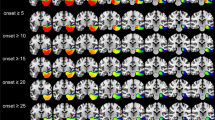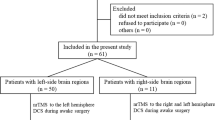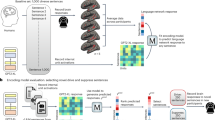Abstract
APPLYING a weak electric current to the cerebral cortex of awake neurosurgical patients is an established method for mapping language zones on the basis of stimulation-evoked errors. Two new findings are reported here—the topographical extent of language cortex in an individual subject can be wider than that proposed in the classic maps, and, within this zone different sites are variably committed to language as measured by the naming function.
This is a preview of subscription content, access via your institution
Access options
Subscribe to this journal
Receive 51 print issues and online access
$199.00 per year
only $3.90 per issue
Buy this article
- Purchase on Springer Link
- Instant access to full article PDF
Prices may be subject to local taxes which are calculated during checkout
Similar content being viewed by others
References
Penfield, W. & Roberts, L. Speech and Brain Mechanisms (Princeton University Press, Princeton, 1959).
Fedio, P. & Van Buren, J. M. Brain Lang. 1, 29–42 (1974).
Author information
Authors and Affiliations
Rights and permissions
About this article
Cite this article
WHITAKER, H., OJEMANN, G. Graded localisation of naming from electrical stimulation mapping of left cerebral cortex. Nature 270, 50–51 (1977). https://doi.org/10.1038/270050a0
Received:
Accepted:
Issue Date:
DOI: https://doi.org/10.1038/270050a0
This article is cited by
-
White matter disconnectivity fingerprints causally linked to dissociated forms of alexia
Communications Biology (2021)
-
Impact of combined use of intraoperative MRI and awake microsurgical resection on patients with gliomas: a systematic review and meta-analysis
Neurosurgical Review (2021)
-
Clinical applications of neurolinguistics in neurosurgery
Frontiers of Medicine (2021)
-
Awake glioma surgery: technical evolution and nuances
Journal of Neuro-Oncology (2020)
Comments
By submitting a comment you agree to abide by our Terms and Community Guidelines. If you find something abusive or that does not comply with our terms or guidelines please flag it as inappropriate.



